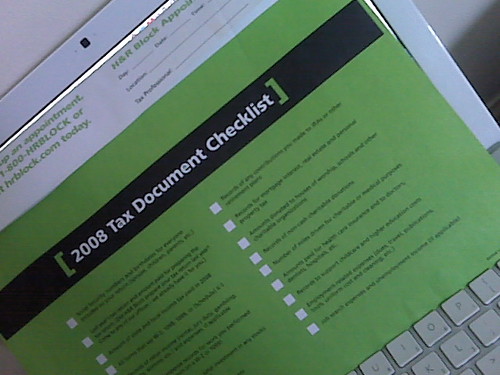The tax pro force's main domain is the home website, where there are both community pages as well as direct "Ask a Tax Advisor" buttons (staffed beginning Jan. 5). The tax team will answer questions directly, of course, but will also "listen" in to concerns or problems being discussed within communities and forums and respond accordingly.The article also brings up the fact that H&R Block were hesitant to get into "digital" at first out of fear that this service would cannibalize business from their retail locations. They have ultimately figured out how to combine the two services, by allowing people who do their own taxes to bring their files in and double check with tax preparers at the retail level. Pretty interesting, and I wonder how successful it will be. I won't be experiencing it first-hand.
In 2008, I did my taxes at H&R Block. I don't remember the details of my experience, which probably means that it was a painless one (considering what tax season can do to people). And everything afterward – the debits to my bank account, the refund check I got later on – went pretty much like clockwork.
Fast forward to last year. In early January, I got a big, empty envelope from them. The insert said something like, "We know you aren't thinking about taxes yet, but we are." And they really seemed to be: the empty envelope had a long check list on the back of it, outlining every document I needed to bring with me to have my return done this year. Before I had even received my W-2, I'd already been set up with a comprehensive list of everything I needed, and an envelope to put it all in.

A few weeks later, the woman who prepared my taxes in 2008 in Florida left me a friendly voice message asking that I call her to make my next appointment. Since I had decided to do my taxes in NY last year, I called a downtown Manhattan location instead. "Yes, I see your information all right here," I was told on the phone. So far so good.
Well, almost. During my appointment was when things got complicated. Really complicated. For starters, their database was being temperamental, which meant my 2007 return was impossible to access. The internal call center couldn't access it either, unless I told them the i.d. number of the Florida store (no, I didn't know it). There is apparently no way to find out a store's i.d. number in their system, even if you have its street address (which they also didn't seem to have; I had to pull it up on my BlackBerry); they eventually had to call Florida directly and ask an employee working in the store. I'd been thinking about internal communications and operations a lot by that point because of then-projects, and it was pretty mind blowing to think that some company databases are not equipped to find (or sort by) seemingly-important, basic information.
Other assorted things that happened during this experience include (but are not limited to):
– Charging me $30 for an extended service plan without asking me
– Not being able to refund the above charge directly (it requires an internal request that takes at least 1 month to process)
– Marking me down for nearly $500 of savings account interest income that was not mine
– Refusing my request to itemize my charitable donations
– Receiving "insufficient paperwork /information" notices from the IRS, leading to 3 more visits to the tax preparer and 2 appointments with a certified H&R Block CPA
– Being told "Oh, don't listen to [your tax preparer], she messes up sometimes," by an H&R Block employee upon one of my return visits in which my tax preparer had stepped out

[Click for bigger, sorry so teeny]
In consumer behavior, there is an adoption process stage called Confirmation. It's pretty much when post-purchase doubt is removed (and maybe evangelism starts, if things are awesome). H&R Block did a stellar job in many ways of making this process as painless as possible to bring me back in. The automatic debits; the checklist envelope; the followup call; and the ease at which I made my 2009 appointment all went above and beyond Confirmation – and the loop was nearly closed (this cycle would have repeated each year, ideally). And I'm sure there are parts of their new digital strategy that work great along with their At-Home kit as well.
But the thing is: companies have to be on the ball at every stage of the journey. What if my 2009 experience mirrors what many first-time-customers and "H&R Block At Home" walk-ins will only ever come in contact with? Because taxes are something we have to do every year, closing this feedback loop is so important! Otherwise people can end up feeling cheated and potentially go somewhere else the next time around. Like me (this year I'll be with an independent CPA that specializes in my industry). Maybe some of their communications budget should have been reallocated into streamlining database infrastructure or more robust employee training, rather than throwing a Twitter account, widgets, blogs, a YouTube channel, a Facebook fan page, AND apps (?!?!) into this strategy.